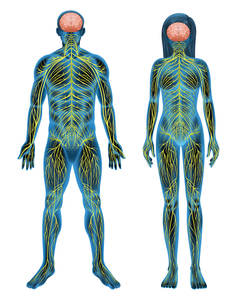When you can't finish a yawn, it means your nervous system isn't releasing as it should.
A healthy nervous system responds to stimulation (both stress and excitement) by regularly discharging the energy.
An unhealthy nervous system has trouble "letting go" creating a backlog of underground tension.
(and eventually causing issues with anxiety and depression)
The key to having a good yawn is in the
nervous system having a feeling of safety.

Warning!
This article may cause excessive yawning 🙂
Warning!
This article may cause excessive yawning 🙂
You probably already know . . . yawning is contagious. Yup, we trigger each other with our yawns.
Is there more to it than that? Or are we connected to each other in ways we are unaware of :-O

Author: Dr. Susan LaCombe
Dr. LaCombe is a 20-year veteran Psychologist and Psychotherapist whose passion is leveraging the power of the autonomic nervous system for managing anxiety and depression.

Trouble having a good yawn?
Have you struggled to yawn . . . you want to yawn but it just doesn't make its way out of you?
Or maybe you can yawn but it's so half-hearted, it feels totally dissatisfying.
Issues related to yawning are actually an indication the autonomic nervous system is under functioning.
One of the key roles the nervous system plays is to manage the charge in your body.
That "charge" is the felt by you when you're nervous. It's also reflected in the vibrational quality of certain organs in your body including your heart and specific areas of the brain.
You might also notice it as a felt sense of arousal in your body. Sometimes, that charge is high . . . so high, you feel quite tense. Regardless of whether you notice it or not, your nervous system is always humming in the background.
In the field of body psychotherapy, we refer to it as your "activation". So your activation can be low or high depending on how your nervous system is functioning.
By the way, this "nervous" energy is not only felt by tension and other sensations in your body, it's also precisely measured through your heart rate variability**.
**Heart rate variability is a physiological measure between heart beats. The higher your variability the healthier your autonomic nervous system.
Learning to complete a yawn
As a therapist, I work directly with the nervous system using a somatic approach called self-regulation therapy. It's a body-based therapy that helps clients gain control over the tension in their body by repeatedly reducing their activation.
In time, it improves their nervous system functioning (and thereby shifts them out of depression and anxiety states).
One of the curious things I've noticed about using this somatic approach, is that I discover "little gems of information". This was the case in understanding the nature of a good yawn.
You see, when clients come to see me for therapy, it's often quite evident that their nervous system is having trouble letting go.
Even when they report feeling relaxed, somewhere in the body it's holding tight. Shoulders may appear fixed in an awkward or uncomfortable position, or breathing may be labored or shallow.
And . . . they can't let go into a good yawn.
However, as our work proceeds, one thing always seems to happen—they're finally able to have a good yawn!
Go ahead have a good satisfying yawn!
Recall the last time you had a really good yawn. You know, the kind where you felt your body settling in.
Did you notice a gentle "after-yawn glow", feeling slightly more relaxed, if only momentarily?

The nervous system ultimately achieves a relaxed state by releasing hormonal energy. It does so through yawns, tingles, tears, twitches among other things. (It's essentially releasing hormonal energy related to the fight, flight, freeze mechanism).
The nervous system "learns"
Your level of activation is determined by the accumulation of life experiences to date.
It keeps record of every trauma you have ever experienced (including time in the womb and your birth experience).
Your level of activation is like a barometer for how much danger Is perceived to be in the environment.

When we're feeling safe, it's easier to let go into a complete yawn.
Whether you feel safe in your life depends on what your nervous system has learned from the past, especially through physical traumas and early relationship experiences with parents and caregivers.
In other words, your activation level determines to what degree your nervous system will feel wary.
Contrast that with the fact that the lower your activation level, the more safe you feel and the easier it is to 'let go' into a big satisfying yawn.
Unsatisfying yawns are related to anxiety and depression
Both anxiety and depression are at the extreme end of a nervous system that's been unable to let go—maybe even for some time.
Just know that a nervous system that isn't releasing, holds onto energy.
The shaky, tingling feelings that sometimes accompany these states is part of the release.
When you can't let go, you're backing up the energy. Your nervous system essentially becomes tighter leading to you feeling anxious.
At this point, yawns become incomplete.
You're no longer able to let go into a satisfying yawn.

When the nervous system is "on guard", a good yawn is easily interrupted.
The tightness in your chest? Yes, that's the anxiety.
If this situation becomes chronic, you're at risk for depression.
By the way, it's been the experience of body psychotherapists that if you allow yourself to feel these body sensations, you help the process along.
Certain psychotherapies are especially good at helping the discharge process (e.g. Self-Regulation Therapy in Canada, Body Psychotherapy in the UK and Somatic Experiencing and Sensorimotor Psychotherapy in USA).
Therapy not your thing?
Yes, there are online programs that can help. Try myShrink's very own De-Coding the Brain.
References
Heller, Diane P. (2001). Crash Course: A Self-Healing Guide to Auto Accident Trauma & Trauma Recover. Berkely, California: North Atlantic Books.

